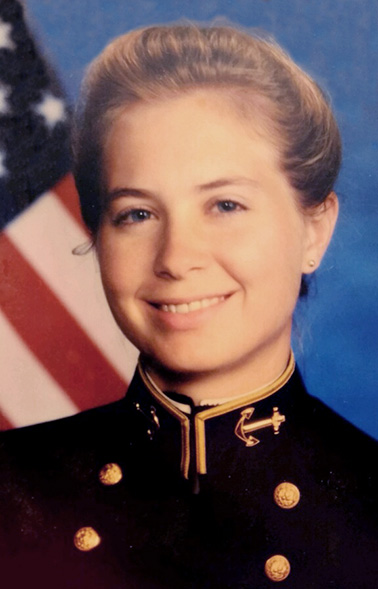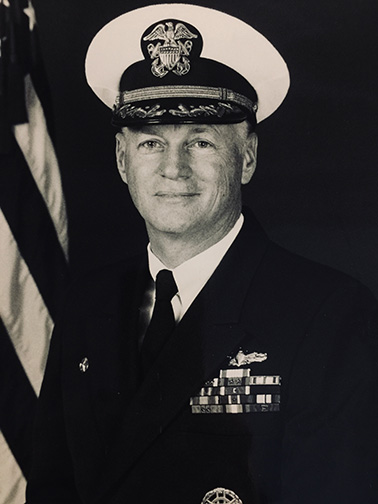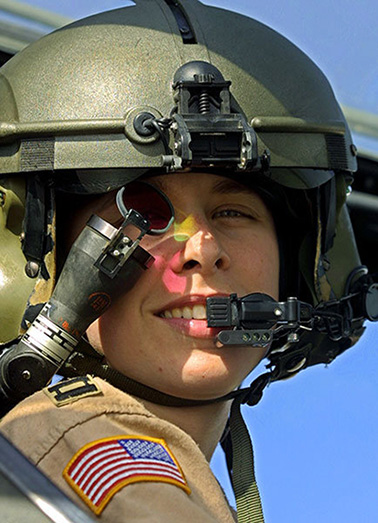In Honor of Our Veterans
Liquid Robotics — November 8, 2018
Veterans Day. For some it’s just a day off, a U.S. holiday they get every November 11th. For many of us, it’s much more. It’s a day we stop to honor all the military men, women and their families who have sacrificed so much to keep our freedoms alive.
At Liquid Robotics, we deeply respect and appreciate our Veterans and their service to our Country. Without their sacrifice the daily freedoms we all enjoy would not be possible.
In honor of Veterans Day, we wish to spotlight some of the Liquid Robotics’ veterans who have served across the Armed Services. We’ve asked a few of our Vets to share their perspectives on their military service, how it prepared them for civilian life and their top lessons learned.
Our honorees are:
Ernie Ferrier, U.S. Navy
Jenny Hauser, U.S. Navy
Don Jagoe, U.S. Navy
Kellie Keller, U.S. Army
Tim Ong, U.S. Army National Guard
Ernie Ferrier, Mechanical Engineering and U.S. Navy (1977-1988)
“Success usually happens from many small steps not one big one.”
Q: Can you tell us a little about your military service?
A: I enlisted in the Navy to gain an education and boy did I get one! Over my years in the service, I was I was trained as a radar technician and stationed at three Naval Air Stations: Patuxent River Naval (MD), Cubic Point (Philippines) and Alameda (CA). In addition, I was assigned to the USS Saratoga Aircraft carrier. I re-enlisted and flew in an F4 Phantom at 20,00 feet upside down! Not only did I get to do all those things, but I had fun doing them and made many lifelong friends.
Q: How did your military experience prepare you for your civilian career?
A: When I left the military and re-entered civilian life I found my Navy experience more than prepared me for the day-to-day challenges of working for small and large companies. This was particularly true in the “get it done attitude” that I have maintained both as a sailor and in my various civilian jobs.
Q: What are the top lessons learned from your military service?
A: That’s simple. They taught me how to work as a team and figure out how to get a job done quickly and efficiently.

Jenny Hauser
Jenny Hauser, Program Manager, former Supply Officer, U.S. Navy
“Getting the opportunity to serve the Country, whether it’s in the military, or any branch of Government Service, is you get to contribute to the business of the Nation. You gain an understanding of how our Government works, which makes you a better informed taxpayer, voter, and a truly participating citizen.”
Q: Can you tell us a little about your military service?
A: I graduated from the US Naval Academy and was commissioned as a Supply Corps Officer. Supply Officers manage logistics, services, material, finances, etc. I served three years as Ship’s Services Officer (managed ship’s store, barber, laundry, and vending for 2,500 crew members) and then Disbursing Officer. I was responsible for $1M in cash and managed post office, military pay, and ATMs onboard the USS Peleliu (LHA-5) (helicopter carrier) and was deployed to Persian Gulf. I served two years as the Supply Officer of Fleet Numerical Meteorology and Oceanography Center in Monterey, CA, where I managed materials and government contracts. I also served as a Command Duty Officer, supporting a 24-hour, 365-day supercomputer center providing global meteorological and oceanographic prediction models to the military.
Q: How did your military experience prepare you for your civilian career?
A: By training me to learn quickly, be organized, pay attention to detail, and to work as a team.
Q: What are the top lessons learned from your military service?
A: First, there is no such thing as too much communication. Second, three mins early is on time.

Don Jagoe
Don Jagoe, Senior Director, Sales & Business Development and US Navy Captain (Ret.)
“You Deserve What You Tolerate.”
Q: Can you tell us a little about your military service?
A: I was a Surface Warfare Officer; 30-year Navy veteran, retired as a Captain (O-6). I primarily served in the Cruiser-Destroyer forces. Additionally, I served on multiple Flag (Admiral) staffs and the Joint Staff. Qualified Joint Service Officer and Sub-specialty in Politico-Military Affairs.
Q: How did your military experience prepare you for your civilian career?
A: My military career provided direct knowledge of maritime operations, technologies and environment. It conditioned me to be comfortable leading large groups, managing diverse pools of talent and public speaking. While in the Navy, I was afforded the opportunity to complete my bachelor’s and three master’s degrees, providing me with critical thinking skills and experience in the written word.
Q: What are the top lessons learned from your military service?
A: Nothing succeeds like hard work and putting in the effort. Secondly, people are the most important part of any organization. Take care of them and everything else will take care of itself.

Kellie Keller
Kellie Keller, Senior Director Business Development and U.S. Army, Company Commander & Apache Attack Pilot
“Practice gratitude. Take the time to appreciate what you have, where you live, what you do, who you are with every day. We are so fortunate to live in a time and place of abundance and connectivity. Life is so short. Make time to travel the world and connect with people.”
Q: Can you tell us a little about your military service?
A: Military service is a family affair. The sacrifice is great, and the deployments are difficult. We feel strongly about being part of something greater than ourselves and protecting the freedoms afforded by our Constitution. My father served two tours in Vietnam as a US Navy Sea Bee, my uncle as an electronics technician. My little sister and my brother-in-law are currently Lieutenant Colonels in the Army with 7 combat tours (Carrie 4, Tony 3). I graduated from the United States Military Academy at West Point in 1999. My service includes 8 years on active duty as an Army AH-64 Apache pilot, including a tour to Afghanistan from November 2002 to August 2003 for Operation Enduring Freedom II & III.
While I was separated from my family for several years, I would do it all over again. The people with whom you serve are just as much your family, and I stay in touch with as many as I can. Some of my friends did not come home, and I strive live each day to the fullest to honor their sacrifice.
Q: How did your military experience prepare you for your civilian career?
A: Every facet of military training prepared me for my civilian career. Being in the military afforded me the experience of working with one of the most diverse organizations and exposed me to different cultures, customs, religions, and beliefs. Understanding personal motivations and different points of view helped me to become a successful business leader, problem solver and teammate. Preparing for any troop movement—from a combat deployment to a physical fitness session—honed my planning and organization skills and prepared me for running large scale efforts as a Program Manager.
As a junior Army Lieutenant, I was solely responsible for accomplishing the mission to include coordinating the logistics and support to get the job done. I had to know the role of every element on the battlefield and be able to either pick up their mission or coordinate a substitute in real time to ensure we achieved our objectives. The ability to strategize several moves out and plan contingencies to accomplish a mission is not a skill easily acquired in the civilian sector. Large businesses enact processes to preserve profits while small businesses have employees wearing many hats requiring much more coordination between departments. Having a veteran teammate with this skill helps elevate teams to think more critically, as well as empowers junior teammates with leadership training they might not otherwise receive in their career.
Lastly, as an AH-64 Apache attack pilot, I had to master the skills of operating my helicopter as well as knowing all the military equipment for friendly forces and the enemy. Being able to handle an aircraft emergency and still fight the battle takes a tremendous amount of intestinal fortitude and puts one in a state of hyper-vigilance that is difficult to mirror in the civilian sector. In that situation, one had to stay calm, stay focused, and deal with the most critical emergency first. Operating a business has many parallels (responding to the customer, the board, the employees), and the ability to stay calm and focused despite the chaos is key. In a business setting, having a clear company mission and vision with prioritized goals eliminates much of the stress and emotion. The leadership skills I learned in the military serve me best when work challenges arise, and frustrations are high.
Q: What are the top lessons learned from your military service?
A: 1. We win as a team. 2. Treat everyone with respect.
Tim Ong, VP of Engineering, former Chief Warrant Officer (CWO), U.S. Army National Guard
“I come from a lineage of generations that have all served this great country; my grandfather in the Army Air Corps, my father in the Air Force, and myself in the Army National Guard. If I look back at each of our careers, I don’t think any of us would have made it so far in our business careers had we not served. That being said, I take serving in the military as a privilege, not as an obligation, to protect and serve what this great country stands for.”
Q: Can you tell us a little about your military service?
A: I was on a bus to basic training the day after graduation from high school. I went on to helicopter mechanic school and went to the unit as a helicopter mechanic and crew chief. I spent two years in the unit as a National Guardsman while attending college as a mechanical engineer. Then I received my orders two weeks after making Sergeant to attend Warrant Officer Candidate school and IERW (Initial entry rotary wing) flight school. I spent a total of 15+ years in the National Guard flying helicopters (UH-1, OH-58, and UH-60) in missions of Air Assault, RAID (reconnaissance and interdiction detachment), Medevac, and humanitarian efforts.
Q: How did your military experience prepare you for your civilian career?
A: As a military officer, the training provided significant experience in managing personnel. It has allowed me to be where I’m today in my business career.
Q: What are the top lessons learned from your military service?
A: Two lessons I learned from the Army: When things get tough, that’s the time to push harder and persevere. You always can count on your “band of brothers” when things do get tough; they are my second family.
On this Veterans Day 2018, we honor these individuals and all the mighty men and women of the Armed Services. We thank you for keeping our Nation safe and free.
